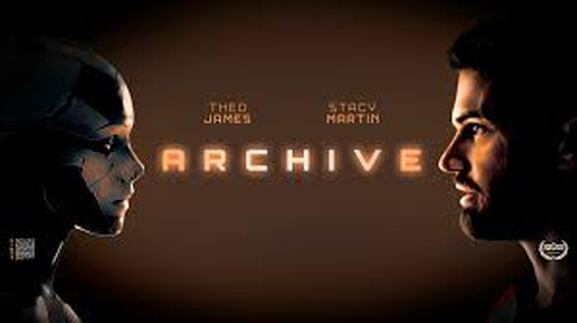Scientist George Almore (played by Theo James) works and lives alone at a giant Artisan Robotics compound in the middle of the forest; alone, that is, except for the presence of two robotic creations who serve as his helpers and children: J1 and J2. George implanted ghosts in these machines to recreate life and add meaning to his work. J1 and J2 are essentially prototypes of George’s vision, appearing to be more so when compared to what the next step of his project is.
The next step involves illegally taking the technology of another business (the Archive collective) and using it to privately upgrade George’s newest corporately-funded concoction (the human-like J3 (embodied and voiced by Stacy Martin)) for personal reasons pertaining to the accidental death of his wife years before. As the unnatural tinkering results in happenings of more profound value, the unreal becomes purer while the natural world continues to be a shell of its former self.
Director-writer Gavin Rothery has obviously been inspired by numerous works of science/science-fiction (from the sleek design of J3 mirroring and building on that of the Machine Man in Metropolis, to a reliance on all the latest think-pieces on how memories make up who a person is, to the nature of the Replicants in Blade Runner media, etc.). What does not show in his final product of Archive, however, is a love for story-telling or an eagerness to explore new ideas.
While everything in Archive is grounded in a gritty, modular aesthetic, it becomes harder to distinguish between what is real and what is ultimately only experienced. The path to creating a physical manifestation of will on reality is paved in George’s disassociation with it. He lives in his head, the only place of control, and the isolated chambers around him symbolize its barriers. Without giving too much away, George is the ghost in his own machine. The robots he lives with want to become more fully realized, but that can only happen by becoming real on their own terms because George’s output becomes internalized.
Very few of these realizations come until after finishing Archive due to how slow and mechanical the film moves. Sure, inexplicable things happen, but they are treated mundanely and within the limited parameters that have been set to see into Archive’s world. Only after a confusing ending do things take on another dimension of meaning. By that time, it is too little too late, and all one is left with is an empty feeling of resignation.
Rating: 3.125/5, or 3 1/8 /5
| archive_review.docx |

 RSS Feed
RSS Feed
